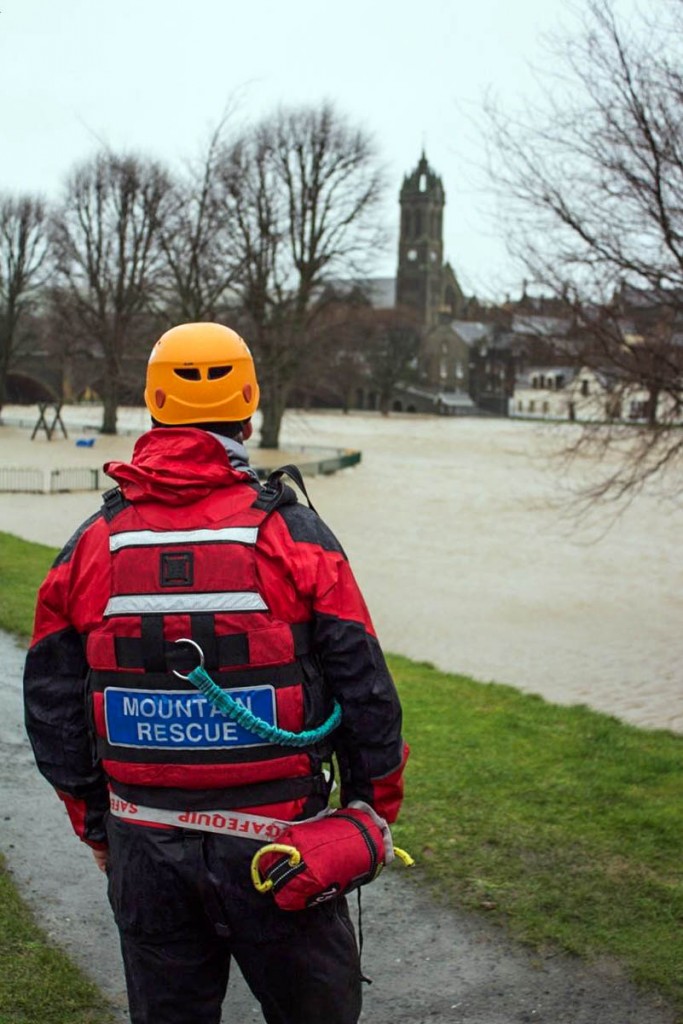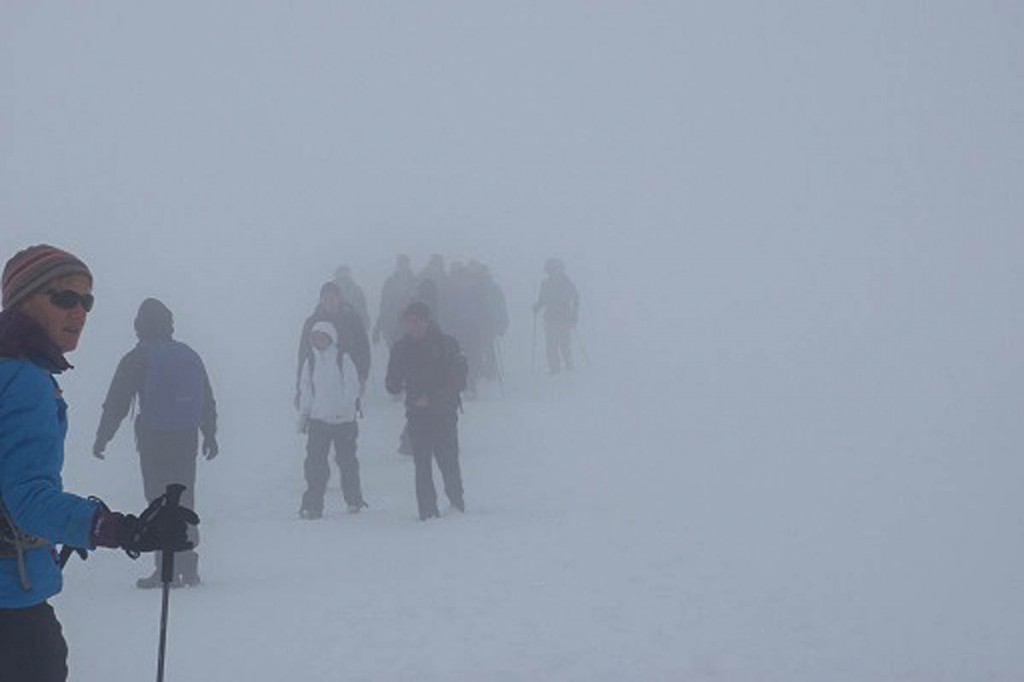Mountain rescuers in Scotland have denied the movement is about to split, after the three busiest teams expressed dissatisfaction with the way its umbrella body was operating.
Glencoe, Lochaber and Cairngorm teams last year proposed separating Scottish Mountain Rescue into two different organisations.
The three teams said the increasing demands on volunteer mountain rescue teams for ‘non-mountain’ operations such as flooding rescues, searches for vulnerable missing people and other non-core mountain rescue activities followed funding cutbacks to statutory rescue organisations meant SMR had lost its focus.
Lochaber, Glencoe and Cairngorm have the largest number of callouts in difficult mountain terrain, with honeypot mountains such as Ben Nevis, Cairn Gorm and those in Glen Coe attracting large numbers of walkers, climbers and mountaineers.
The three tabled a motion for the organisation’s annual meeting, saying: “We no longer feel that Scottish Mountain Rescue represents the interests of our teams. We believe that the requirements of search and rescue and mountain rescue are now so diverse that the interests of both operational areas would be better served through separate representative bodies.”
The three also believed there was a ‘democratic deficit’ in the way SMR, which distributes the annual £312,000 Scottish Government grant, was being run.
Other proposals put forward included splitting the organisation geographically, with the northern teams having a bigger say than those in the South and East, and the western teams.
Lochaber MRT secretary Miller Harris told the BBC recently: “All the hassle that goes with a strategic organisation is not worth it with the amount of money that filters down. We’re just fighting for crumbs.
“I have the utmost respect for the recent work done by teams during flooding in Hawick and Lockerbie.
“It’s a fantastic service, but it’s not what we do. What I can offer is 20-plus years of experience at the sharp end on Ben Nevis.”
The Lochaber team, which carried out 130 rescues last year, receives the largest chunk of the shared government cash, £24,000 a year.
But the three teams and acting SMR chair Steve Penny of Tweed Valley MRT, who took over from Cairngorm MRT member Simon Steer at the head of the umbrella body, moved to take the heat out of the row with a joint statement.
Mr Harris and Mr Penny said: “There has been considerable press and social media cover about the decision of Glencoe, Cairngorm and Lochaber MRTs to resign their voting membership of Scottish Mountain Rescue.
“We both feel that while it is healthy to debate these issues, some of the comments are misinformed and not representative of the position or views of the respective parties within SMR.
“While our geographic areas and operational demands are different across Scotland, we all have one thing in common, which is that we are volunteers and as volunteers, we probably have more in common than our differences.
“The teams that collectively deliver mountain rescue and search and rescue services across Scotland can deploy personnel into every part of the country and those in need can be comforted in the knowledge that they will receive a world class service that will cost them nothing.
“The primary purpose of around 1,000 volunteers currently in SMR is to offer a wide range of skills that are appropriate to their own local area. Whatever happens in respect of the administration of the organisation, none of that will change. Every team has been set up and runs as its own body and most have done so for around 50 years.
“The current discussions have largely been imposed on us all as volunteers by the pressures created by outside influences. We have seen significant changes which have put considerable pressures on rescue teams and the demands on volunteers’ time.
“This has resulted in increased expectations on what volunteers will contribute in support of reduced resources in the non-voluntary sector. Decisions are being made at a strategic level which ultimately impact on operational expectations of volunteers.”
The statement said SMR has to review and refresh to meet the needs of an ever-changing operational landscape. “So, yes, GLC [the three teams] feel that the national body has lost focus from their point of view and that needs to be resolved,” it said. “It is healthy that teams can feel that they can question and challenge an organisation that exists to help them deliver at the sharp end.
“We must accept that Scottish Mountain Rescue – the charity – is entering a period of change. However, Scottish mountain rescue – the activity – as delivered by the teams across Scotland will continue as it has always done.
“We must stress that no teams have actually ‘left’ SMR and there is no ‘split’. GLC would still wish to be affiliated to SMR and will continue to support the wider mountain rescue community in whatever way they can.
“Where appropriate we believe that the current healthy exchange of skills to facilitate training and information exchanges within the organisation will continue irrespective of the outcome of current discussions.
“So, if you are unfortunate enough to need to call on the services of a mountain rescue team anywhere in Scotland then don’t worry: it’s very much business as normal and we will drop what we are doing, grab the packs and head out to help you.”


Madcarew
05 February 2016I was convinced it was only a matter of time before the strain of adopting a wider civil contingency role would take its toll on the brave and dedicated men and women of the voluntary mountain rescue teams. Mountain and outdoor callouts are on the increase in most areas putting additional strain on the working and family lives of team members in their conventional role.
I guess government thinking was that getting MRT's involved in a wider role would provide a lot of very expert bang for not much buck and therefore save the Fire and Rescue Service a lot of money training additional boat crews, swiftwater rescue technicians etc.
Full time and part time (retained) firefighters have to be paid!
As a retired firefighter, the thought has crossed my mind who is minding the shop as I wander around the hills when so many MRT resources are seen deployed at lowland flooding incidents.
In the years after the second world war the UK had a civil defence service. Maybe the time has come for the government to bring it back into being and absorb ALSAR teams into the structure....oh yea they would have to spend some money to do that.
Ian512
06 February 2016The appropriate use of teams in 'exceptional circumstances' can slowly lead to it becoming the norm to call on a rescue team when assistance is required. After all it must be a great financial saving for the authorities.
An incident a couple of years saw the police call on a team to assist a motorist who has become stuck in 6” of snow. Apparently one of the team took his own Land Rover out to get the motorist moving; is this appropriate?
Unintended consequences have to be considered - how long before a Politician decides that Mountain Rescue should come under the control of Fire and Rescue?
Ian512
09 February 2016In addition to my previous comments I’d like to highlight the following paraphrased press release and an example of Fire & Rescue 'possibly' taking on too much in their fairly new rescue roll.
“Scottish Fire and Rescue Service's specialist line rescue and water rescue teams were called out to help rescue a dog which had got itself stuck down a 30m ravine at Blair Atholl, January 2016. Using their specialist skills and equipment the Station Manager said, fire-fighters were able to locate the dog and raise it up to safety. The river was in spate, it was pitch dark and the animal was located 30m down into the ravine.”
A more recent search, for a missing person, saw a ‘large’ number of Fire & Rescue vehicles, clearly in command. All attention appeared to be focused on the water and the officers searching the edges of a very high, fast flowing river. Later a Rigid Inflatable Boat was launched.
There was little sign of an organised land search taking place; yet it was reported that the missing person was found ‘near’ the river later in the day.
There were few Mountain Rescue vehicle present, yet until recently the Civilian or Police Rescue Team would have taken both those calls.